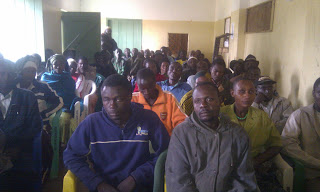Kamala
J. Lutatinisibwa authored the following article on how residents of Kagera region used to celebrate Chrismas so many years ago. I found it a great article worthy publishing on my blog. Please, read on:
Though things have changed, this is how we
used to celebrate Christmas Day...
During
childhood in 1980’s and 90’s, the 25th
of December was treated as a great and special day. It was Nweli day,
my tribal pronunciation of an English word “Noel”. Neither my
parents nor our village mates knew what Christmas meant, that it was the
celebration of the birth of Christ. Instead we just knew it was a big day (sikukuu)
and had to be vigorously celebrated regardless of ethnicity or religious
differences. Both Christians and non-Christians joined their efforts enjoy it.
It took some years for village mates to realize that Christmas Day had some
historical and spiritual meaning.
Preparation
for the Next Christmas day celebration took all year long. The villagers formed
groups in which cash was collected gradually from January so that at the end of
the year, members of each group could afford to slaughter a cow or a goat,
sometimes even a swine. Men always collected money for as much local brew as
possible. As children
we had to wake up early in the morning to milk cows and then boil tea for our
soon to wake up parents, so they could enjoy their Christmas breakfast.
Beef and
other meats had to be prepared in advance. The Christians rushed to our one mud
walled church some kilometers from home where all prayers and worship had to be
very short since believers wanted to rush home for their beautiful meal being
prepared at home after which, everyone wanted to be the first attendee at a
local brew pub to irrigate their throat. Christmas
day was almost the one and only one day in which the youngsters could wear a
necktie carelessly of type of a dress covering one’s body. Remember we used to
buy oversize clothes so that we could grow up with them. Sometimes your eldest
brother decided to equip you with his shirts and shoes for Christmas day.
Sometimes a
relative living abroad would send us some shoes for Christmas carelessly of the
size that fits you. It was like a comedy show as we walked to and from our
village church. Almost everyone had developed a new walking style - some could
limp, others walked as if they are preventing their shoes from leaving their
legs. Our eating
place had no chairs, and we had to sit down on the floor with neckties and with
our oversized new clothes. But we would invite our neighbor for lunch and
everyone would enjoy being together. As young
boys, we did anything to prove our superiority in order to attract girls. I
remember one Christmas day when I with three friends, happened to have a few
coins. We bought one bottle of Coca-Cola, then we carried the bottle by all the
houses that where girls of our age lived while holding it. It added our names
into the number of the village’s superstars since not many young people knew
the taste of Coca-Cola.
At around
5pm, we started drinking our coke, one at a time. Our teeth were strong enough
to open the bottle, so no opening machine was needed. Each could take one
swallow and hand the bottle to his waiting neighbor. We did this repeatedly
especially when we came across girls. But we ended up fighting, since the
bottle seemed to be emptied before quenching our thirst. The last person to
take a swallow was always blamed for having a big mouth - otherwise the soda
couldn’t finish so easily. Yet history was made - these guys drank coke during
Christmas Day!
Don’t ask me
about our fathers and brothers – by then they were in the local bar, irrigating
their throats with local brew. They always shouted at one another strongly
since after inhaling local brew, it converted everyone into thinking their
cleverness was more than others and had to speak it out. By the end of the
night only a few of them could manage to stand on their own feet.
Our moms and
sisters stayed at home cleaning dishes. People passing by congratulated us for
seeing such a great day. Our fathers remained in bars until the next day for
gulped brew didn't allow them to walk on their own feet.
The next day
was referred to as a second Christmas day, (you call it Boxing Day) many
villagers were injured as a result of fights and violence aggravated by
excessive consumption of standard-less local brew. Above all, many of us ended
up with stomachaches since we had over-eaten on Christmas Day.
And
Nweli seemed to always end with a number of misunderstandings that had to
be solved by village elders. Nowadays things are different, knowledge has
spread and therefore Christmas Day is celebrated only by Christians and not by
everyone anymore.
Do people
still drink like crazy? I don’t know, but something good is that when it comes
to celebrations, especially when you don’t know what and why are you
celebrating, things prove great, well and good. You simply have to enjoy
without questioning.
At the end
of the day, we washed our clothes and shoes, ready for the next great day! New
groups had to be formed early in January to prepare for the coming December,
Things have changed, we are educated, dwelling somewhere in cities, but we can
never forget our past, this is in a nutshell how we celebrated Christmas day in
my local village in Bugandika Ward, Kagera region, somewhere in Tanzania.
Source: Mabadiliko network





